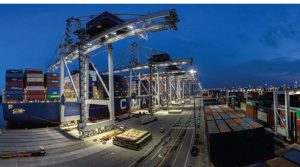
By Rohit Dev Sethi
The global textile industry, a cornerstone of modern commerce, faces mounting pressure to adopt sustainable practices across its operations. Logistics, encompassing shipping, transportation, and distribution, stands out as a critical area for reform due to its significant environmental footprint. With rising consumer awareness and regulatory pressures, the textile industry is pivoting towards greener logistics solutions. This article explores the challenges in sustainable textile logistics and highlights solutions like smart packaging and local sourcing to minimize environmental impact.
Challenges In Sustainable Textile Logistics
The logistics sector for textiles involves a complex network of global supply chains, characterized by extensive transportation across continents. This system depends heavily on fossil fuels, resulting in substantial greenhouse gas emissions. Additionally, inefficient supply chain management can lead to excessive energy consumption, delays, and wastage.
Another significant challenge is packaging waste. Conventional textile packaging often involves single-use plastics and non-recyclable materials, contributing to the growing problem of landfills and ocean pollution. The industry’s reliance on air and sea freight further exacerbates carbon emissions, with air transport being particularly detrimental to the environment.
Lastly, the globalized nature of textile production creates challenges in balancing cost efficiency with sustainability. Brands often prioritize low-cost production in distant locations over local sourcing, leading to a longer carbon-intensive supply chain. Aligning economic priorities with environmental sustainability remains a tough balancing act.
Solutions for Sustainable Logistics
Despite these challenges, the textile industry is making strides toward sustainability by adopting innovative solutions. Two key strategies—smart packaging and local sourcing—have emerged as effective ways to reduce the environmental impact of textile logistics.
Smart Packaging: Reducing Waste And Emissions
Smart packaging technologies are revolutionizing the logistics landscape by focusing on material efficiency and waste reduction. For instance, biodegradable and recyclable materials are replacing traditional single-use plastics. Packaging designed to be lightweight and compact minimizes the space required for transportation, reducing fuel consumption and emissions.
Another promising innovation is the use of reusable packaging systems. Some companies have adopted returnable packaging models where customers can return the packaging for reuse, significantly cutting down on waste. Additionally, advances in packaging technology now allow for temperature regulation and moisture control, ensuring the safe transportation of textiles without relying on plastic wraps or foam.
Smart packaging also leverages digital technologies to enhance sustainability. For example, RFID tags and QR codes provide real-time tracking of goods, improving supply chain transparency and reducing the risk of overproduction or excessive inventory. This not only minimizes waste but also ensures that resources are allocated efficiently.
Local Sourcing: Building Shorter, Greener Supply Chains
Local sourcing, another transformative approach, addresses the environmental impact of long-distance transportation. By prioritizing local suppliers and manufacturers, textile companies can significantly reduce their carbon footprint. Shorter supply chains mean fewer emissions from freight and quicker delivery times, benefiting both the environment and operational efficiency.
Incorporating local sourcing into logistics strategies can also enhance resilience. Localized supply chains are less susceptible to global disruptions, such as geopolitical conflicts or pandemics, ensuring steady operations. Moreover, supporting local economies aligns with broader corporate social responsibility goals, fostering goodwill among communities and consumers.
To effectively implement local sourcing, businesses must assess the availability of raw materials and production capabilities within their regions. Partnerships with local artisans and smaller manufacturers not only reduce environmental impact but also preserve traditional craftsmanship, adding value to textile products.
Collaborative Efforts for a Greener Future
The journey toward sustainable textile logistics requires collaboration across the industry. Stakeholders, including manufacturers, logistics providers, and policymakers, must work together to create a conducive environment for sustainable practices. Governments can incentivize green logistics through subsidies or tax benefits, while manufacturers can innovate with eco-friendly materials and production methods.
Technological advancements play a crucial role in achieving sustainability. Tools such as artificial intelligence (AI) and machine learning can optimize delivery routes, reduce idle time, and improve inventory management, further cutting emissions. Blockchain technology enhances transparency in the supply chain, ensuring that sustainability claims are verifiable and trustworthy.
Consumer behavior also drives change. Growing demand for sustainable products compels brands to rethink their logistics strategies. Educating consumers about the environmental impact of their purchases and encouraging the return or reuse of packaging fosters a culture of responsibility.
Conclusion
Sustainable textile logistics is not merely a trend but a necessity for the future of the industry. Overcoming challenges like high emissions and packaging waste requires a multi-faceted approach involving smart packaging, local sourcing, and technological innovation. By committing to these practices, the textile industry can significantly reduce its environmental impact, meet regulatory standards, and align with consumer expectations for greener operations. Collaboration and innovation will be the driving forces behind a sustainable and resilient textile logistics ecosystem.
 Editor’s Note: Rohit Dev Sethi is managing director at India-based ColossusTex
Editor’s Note: Rohit Dev Sethi is managing director at India-based ColossusTex
January 21, 2025




